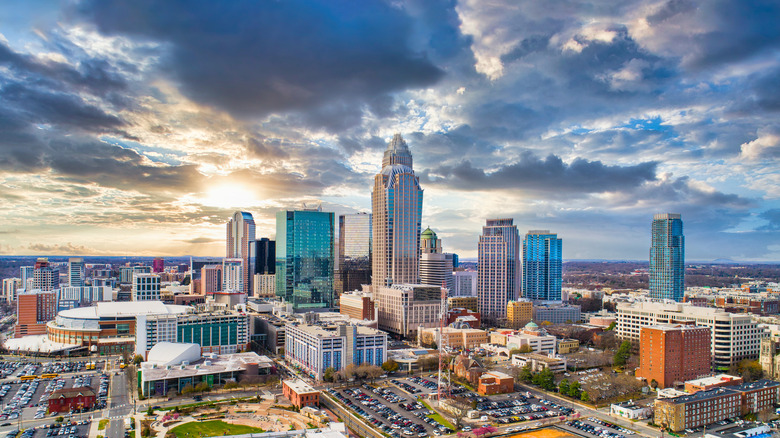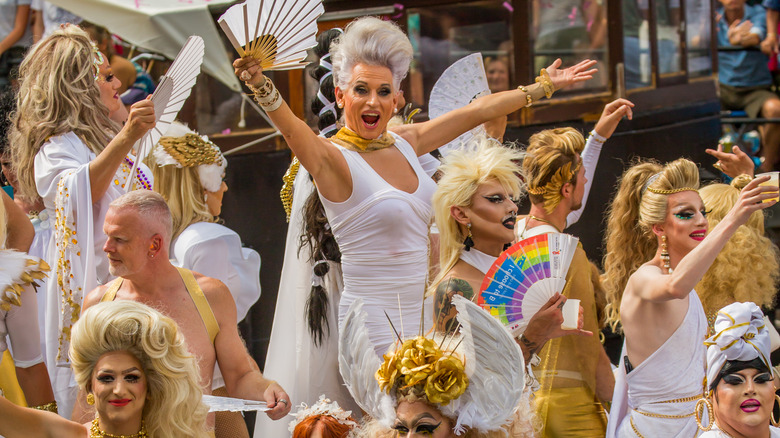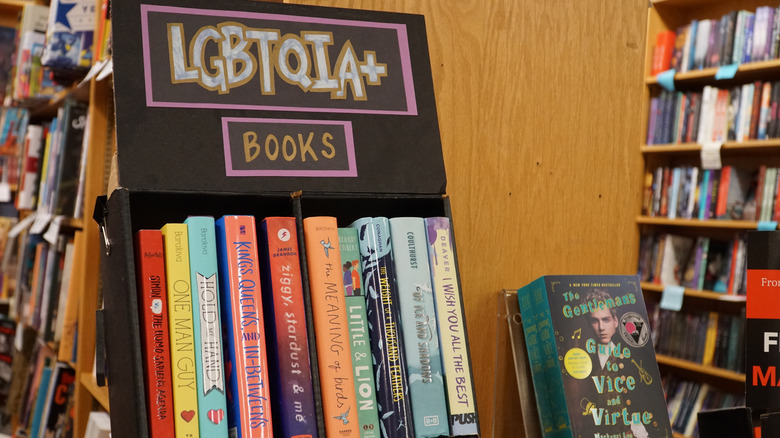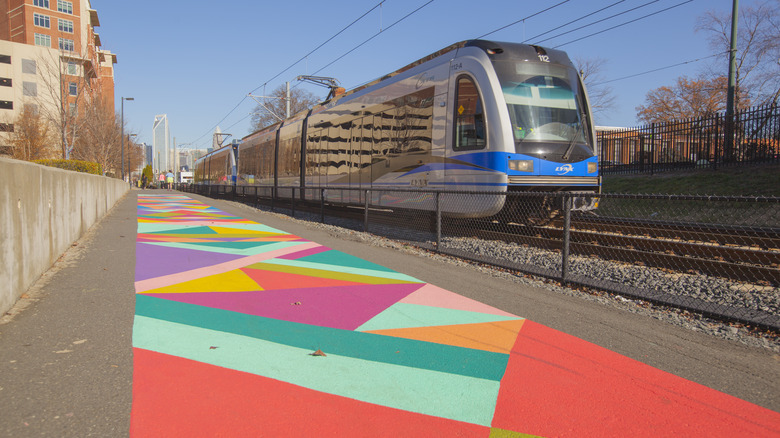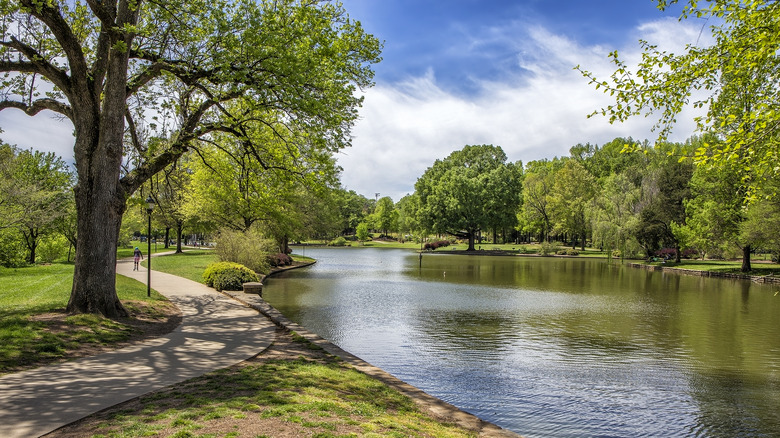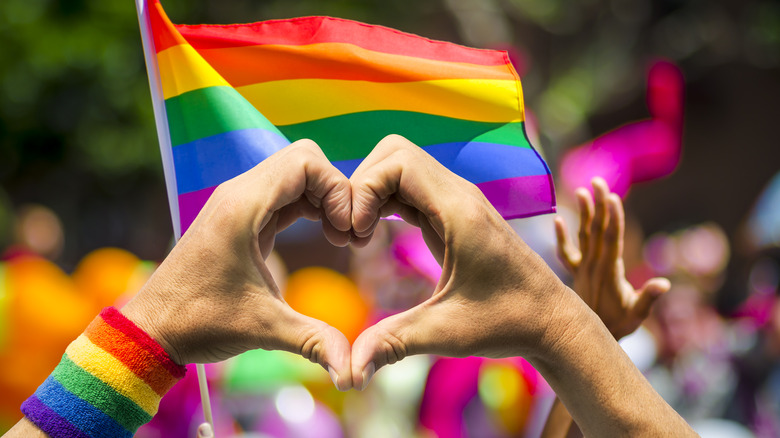The 5 Best Neighborhoods To Live In Charlotte, North Carolina If You're LGBTQ+
Charlotte, North Carolina embraces many neighborhoods with a significant LGBTQ+ population. However, unlike San Francisco's The Castro, New York's West Village, or Chicago's Boystown, there is no particular queer epicenter in the Queen City. According to Creative Loafing Charlotte, obvious gay neighborhoods are not the norm in the South, and this city's pro-LGBTQ+ ones are no exception to that rule. Nonetheless, from "The Gayborhood" NoDa to the historic gay suburb Dilworth, with SouthEnd, Plaza Midwood, and Uptown in between, Charlotte has a number of gay-friendly sections. The neighborhoods also attract straight, hip, and artsy visitors.
Today's Charlotte is the product of old-time Southern values and a sometimes stumbling march toward acceptance and inclusion. Per San Diego Lesbian, Gay, Bisexual, Transgender News, Charlotte has numerous openly gay and lesbian elected officials, and they have promoted Charlotte's acceptance of the LGBTQ+ community. The city has implemented a directory in which same-sex couples can register their partnership status. Previous discriminatory legislation has been replaced by pro-gay ordinances passed by the city council. The Carolinas LGBT Chamber of Commerce promotes queer business, and Stonewall Sports Charlotte sponsors the Charlotte Royals, a gay rugby team that also welcomes trans and non-binary athletes. The annual Reel Out Charlotte, held in the city's north end, is a five-day LGBTQ+-themed film festival. According to the UCLA School of Law, Charlotte's population of one million includes approximately 74,000 LGBT adults, one of the Southeast's largest gay and lesbian concentrations.
NoDa
If there is one Charlotte neighborhood that qualifies as a distinct gayborhood, it is NoDa. North of the central city, NoDa encompasses Charlotte's North Davidson and 36th Street section. It is easily accessible by light rail and trolley car and is conveniently within reach of the LGBTQ+-friendly confines of SouthEnd and Uptown.
Travel Lens describes NoDa residents as culture vultures, and characterizes the neighborhood as a place where diversity and inclusion are practiced. Once an industrial section of Charlotte, NoDa has since been spruced up with street art, vendors, performance spaces, and galleries. There are multiple music venues, including the Neighborhood Theater, and shops galore in this gay/hipster hotbed. Drag emporium Chasers NoDa draws crowds as do the drag brunches at Artisan's Palate while Steamer's Sports Pub is a lesbian go-to spot for Sunday football watching.
Per Saussy Burbank, art infuses every aspect of daily life in NoDa. There are tattoo parlors, artists' studios, and murals throughout the colorful neighborhood. NoDa Company Store and music venue Evening Muse are two can't-miss spots, and like everything else in NoDa, they are within a five-minute walk.
Plaza Midwood
As described by Queer In The World, Plaza Midwood is an amalgam of the classic Old South and the modern LGBTQ+ scene. The center of this edgy, queer-allied neighborhood is the intersection of Central Avenue and The Plaza, which is a couple of miles from Uptown. In addition to its gay cachet, Plaza Midwood is an artsy, hip, and straight destination. Gay venues Petra's and nautical-themed gay bar Snug Harbor are popular Plaza Midwood hangouts. Hattie's Tap and Tavern has a loyal lesbian following. Gay bookstore/gift shop White Rabbit is a neighborhood magnet. A thriving food scene is another inducement to experience Plaza Midwood. Holy Trinity Lutheran Church is an LBGTQ+ ally located in the Plaza Midwood neighborhood.
Per the U.S. Census Bureau, as quoted in EdgeMediaNetwork, the highest amount of same-sex couples in the Carolinas reside in the Plaza Midwood and NoDa code. The number of gay pairs is growing too. As is true for many of Charlotte's queer neighborhoods, gentrification has taken its toll and living in Plaza Midwood comes with a price. In this case, the median home prices have risen to $770,000.
SouthEnd
Craft breweries, coffee shops, galleries, bars, and street art liven up the LBGTQ+-friendly SouthEnd neighborhood. Its Charlotte Rail Trail is enjoyed by residents and visitors alike for walking, running, and cycling. Median home prices there are a pricey $530,000.
SouthEnd's nightlife is legendary. USA 10Best recommends visiting the Marigny Dance Club, a decadent neighborhood fixture known for its gay New Orleans atmosphere. Gay Cities recommends Sidelines Sports Bar and Billiards, which sets out to be LGBTQ+-inclusive and succeeds. The Bar At 316 (Rensselaer Avenue) is a beloved SouthEnd spot and it is Charlotte's second oldest gay bar. Cocktails and karaoke rule there. The Scorpio is the longest-running gay bar, and it features live drag shows nightly. It is located in the city's West End, another gay-friendly neighborhood. Additionally, Carson McCullers wrote "The Heart Is The Lonely Hunter" in SouthEnd. The world's first Pepsi bottler is also there, and Thomas Edison helped introduce the city's first streetcar in SouthEnd. The vehicle back-and-forthed from this neighborhood to Dilworth.
Dilworth
Dilworth is Charlotte's original suburb and achieved renown as the site of the U.S.'s first gold rush in 1825. More than 1,000 architecturally important structures have earned it a place in the National Registry Of Historic Places. Many Dilworth businesses and restaurants are based in classic former homes. Axios Charlotte calls it the city's most walkable neighborhood, and more sedate than nearby SouthEnd. Dilworth's boundaries extend to 100-acre Freedom Park, renowned locally for its spectacular skyline views. Interestingly, the enormous Family Dollar chain started in the Charlotte's Dilworth section.
Throughout a 20-year period lasting into the 1990s, Dilworth was considered to be Charlotte's gayest neighborhood population-wise, per QNotes Carolinas. Today it maintains a reputation as Charlotte's Alt Central. Murals and poems adorn the sides of many Dilworth buildings, and the decorations are so ubiquitous, that there are several walking tours to view them. According to History South, the neighborhood's gay heritage is literally illustrated by a mural of drag icon Brandy Alexander. It was painted to challenge anti-transgender legislation passed by the state in 2016. Two LGBTQ+-inclusive bars near Dilworth are Bar Argon and members-only Cobber. After a night of over-indulging, a Dilworth denizen can even make an appointment at Hydrate Medical for an IV hangover curative. The Charlotte Observer identifies several gay-friendly congregations that are based in Dilworth. Among them are Dilworth United Methodist Church, First Christian Church, and Havurat Tikvah.
Uptown
Charlotte residents don't speak of Downtown. Instead, Uptown is the preferred term. It is the nation's second-largest banking district, according to Uptown. It is also where you will find Charlotte's Pride Festival & Parade, annually the city's largest pageant with 200,000 visitors and participants, per Charlotte Pride. It is second in size only to its Atlanta counterpart. The area stretches across Queen City's First through Fourth wards and contains Charlotte's downtown business district. The gay-friendly neighborhood is also the city's financial center as well as its art hub. The Bechtler Museum of Modern Art, Mint Museum Uptown, Blumenthal Performing Arts Center, and the Harvey B. Gantt Center for African-American Arts and Culture are local highlights. The Charlotte Ballet is headquartered here as well.
Hartigan's Irish Pub in Uptown is an unusual combination of sports bar, nightclub, and gay bar, and is a popular gathering place. Romare Bearden Park is Uptown's own version of Central Park. The Caldwell Presbyterian Church in the First Ward and First United Methodist Church in the Fourth are two pro-LGBTQ+ congregations located there. Two of Charlotte's enduring symbols, hornets' nests and crowns, adorn the Uptown neighborhood.
